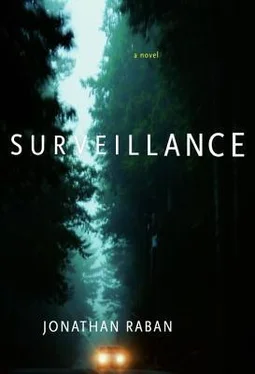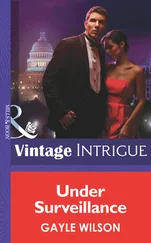A section of Route 99 had been closed for the exercise, which was happening in an area five city blocks square. Yet even in this micro version of nuclear horror, chaos was already breaking out all over, less than fifteen minutes since the bang. Judging by the fire trucks now homing in on it, and by the stream of silver suits running northward, the fire was out of control. Tad heard gunshots, which surely weren’t called for in the script.
He hated working with amateurs. They never understood the fine line dividing real life from theater. They always overdid it. He hoped against hope that the exercise would be called off before he had to be dug out from the rubble.
The Red Cross driver had turned his whooping siren on. They were in regular traffic now, out of the exercise zone, speeding past a jam of diverted drivers on their way to work. This greatly excited the boy, who began to whoop in tune with the siren.
Tad hated working with children, too. “You’re giving me a headache, kid. What’s your name, anyway?”
“Taylor.”
“Taylor, I’ll give you a buck if you chill out and shut up till we get to the hospital, okay?”
“Done deal,” Taylor said. He looked and spoke like one of those kids whose parents dragged them from audition to audition. Too cute by half, and then some.
Tad dug into the back pocket of his pants, removed his billfold, and peeled off a dollar that the boy took without thanks. Professional curiosity made him ask, “You getting paid for this, Taylor? Or are you a volunteer?”
“Fifty bucks,” the boy said with a smirk. “I was a Munchkin in The Wizard of Oz at the Fifth Avenue Theatre. And I was in The Nutcracker at the Opera House. How ’bout you?”
“If you’re getting paid, kiddo, if you think you’re an actor, you better learn to wipe that stupid grin off your face. This is a pro speaking. You’re a casualty. You’re probably going to be dead of radiation sickness in a week. Think of your parents. Think of the funeral. You’re one unlucky kid, Taylor. You in Little League?”
“Yes.”
“Well, think about this. You’re never, ever going to play another game. You understand that? You’re history.”
The grin was at last beginning to come unstuck.
“If you’re going to act, act good. Act real. Let me tell you something about the way you played that kid climbing out of my bus: it stank. Every other kid was dead, and you looked like it was Christmas and Santa had just popped out of the chimney. Next time you’ve got to be the character, right?”
“Right.” A chastened mumble.
Tad laid his arm across Taylor’s shoulder. “Just some friendly advice from an old actor. What are you next?”
“I got a dead mom. She’s lying in the road, blown out of our car on the way to school.”
“So you’re in white shock. It’s too early for grieving. You’re a disoriented zombie. A shivering blank. And after Decon, you will be shivering. Think about it, Taylor. Learn to act. ”
At Harborview, the boy joined the cheerful line of people queuing at the entrance to the Decon tent: evidently no one had warned them of the intimate humiliations that lay in store. The car with City of Seattle plates and “ZACHARY” posted in the window was waiting to drive him to his next engagement. A change of shirt and trousers was on the backseat, along with a woolen balaclava helmet and his makeup-sponge bag. Before he climbed in he turned and called, “Hey, Taylor! Taylor! Break a leg, kid!”
LUCY BENGSTROM was in luck that morning. The bomb-scare shenanigans going on downtown had freed the suburbs from their usual swarm of officious security types. On the dot of 7:30, aiming to catch the 9:30 ferry from Mukilteo to Whidbey Island, she’d parked her daughter, Alida, in the Early Birds program at her school on Capitol Hill. As it turned out, the drive to Mukilteo was a breeze: no soldiers manning the checkpoint on I-5, and the search of her car at the ferry terminal was merely a command to flip the trunk and an incurious glance inside. She was waved onto the 8:30 boat with nearly ten minutes to spare.
Earliness made her feel she’d won a surprise vacation as she got coffee from the machine in the passenger lounge and took it out onto the stern deck. It was holiday weather. For the entire last week of March, the temperature had been up in the eighties, and today, April 2, they were saying on the radio that it would likely pass ninety. To be wearing a dress that she’d bought for summer in Hawaii on a spring day in the Pacific Northwest was an oddity to add to all the other oddities of life in the last year or so: they steadily accumulated, like snowfall — another thing that wasn’t happening the way it used to.
Water boiled in the dock and the ferry pulled slowly away from the ramp. Sipping at the tepid espresso, Lucy felt properly afloat again, at last.
The call from GQ had come in the nick of time — the first assignment in many months that she could really sink her teeth into. Back in the nineties, when East Coast editors thought of the Pacific Northwest as the new big thing, Lucy was offered far more work than she could possibly take on, but since then the region had lost much of its sexiness and the dateline “ Seattle ” was beginning to look like déjà vu all over again. The old-new public library, the international toast of 2004, had long slipped into yesterday-land, though a recent string of gruesome serial murders, recalling Ted Bundy’s exploits and the Green River killings, had briefly jolted Seattle back into the news. Lately, she’d been scratching a living out of travel pieces — short trips with Alida in tow, during school breaks — and wry reports from the deep sticks for “Talk of the Town” in The New Yorker. She called editors nowadays, and sometimes her calls were returned.
Before the GQ editor phoned, she hadn’t known that August Vanags lived in her territory, though she knew of his book, of course. Impossible to miss its long bestsellerdom, or the bidding war between DreamWorks/Paramount and Miramax for movie rights; Spielberg had won, if that was the word, and paid gazillions. She’d gone straight out to buy Boy 381, the title superimposed on a creased and grainy black-and-white snapshot of a starveling boy standing against a forbidding barbed-wire fence. Leery of its blockbuster success, she’d begun to read, expecting to find it not half as good as it was cracked up to be.
But she was swept away, almost from the first page. It was amazing that this memoir of an orphaned child caught up in the worst barbarities of World War II could be so light, sweet-tempered, brave, and funny. From his terrible boyhood spent among the displaced and terrorized people of Central Europe, overrun now by Hitler’s armies, now by Stalin’s, Vanags had somehow conjured a magical, inspiring book. It was as if Huck Finn had been set adrift in this refugee world of trains, and labor camps, and trudging columns of shocked, exhausted men and women trying to escape. Like Huck’s, the boy’s voice was clear and true. He was all eyes and ears. Faced with atrocity, he described what he saw in terms that were heartbreakingly simple and exact. Only a child could have such resilience — could have made for himself out of such wretched material a life of boyish mischief and boyish happiness. At the end, when the young Vanags was rescued in Germany by the gruff American sergeant Philip Cahan, Lucy, who never wept over books, found her eyes prickling with tears.
The guy from GQ had said that Vanags was as obstinately reclusive as Salinger: since the book first started showing up on the bestseller lists, he’d declined all interviews and refused to budge from his island. “It’s a unicorn hunt,” he’d concluded, but he somehow had got hold of Vanags’ phone number. He offered $4,000 for preliminary research, and $25,000 if Lucy could talk this reticent hermit into an in-depth interview-profile. “You’re good at that stuff. Like you got Bill Gates…that was a great piece. I don’t know what’s with Vanags. It could be he’s just shy, but he was a history prof before this book happened, so a ton of people at the University of Washington must see him. Maybe it’s an academic thing: you know, this disdain for journalists.”
Читать дальше












